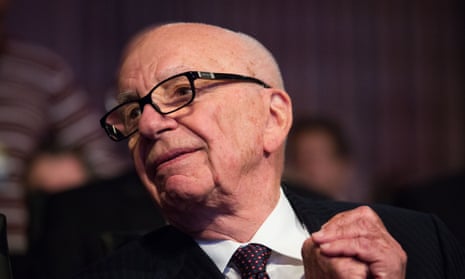What a coincidence. While the government threatens the existence of the BBC, forcing it to cut back its news division, along comes a news competitor in the shape of Times Radio. Before we leap to the conclusion that the two initiatives represent a coordinated pincer movement against the corporation by the prime minister, Boris Johnson, and the Times’s owner, Rupert Murdoch, let’s stand back for a moment.
Years ago, when Johnson’s Downing Street ambitions looked less than likely, Murdoch’s News UK chief executive, Rebekah Brooks, was already thinking about how to diversify its print operation. In 2016, when she oversaw the acquisition of a broadcasting outfit, the Wireless Group, she hinted at the strategy by saying: “It will allow us to bolster our products by sharing the best journalistic content.”
So, Times Radio had a long gestation period before last month’s announcement that the digital station is to be launched later this year, possibly before autumn. According to its launch director, Stig Abell, editor of the Times Literary Supplement and former managing editor of the Sun, it will offer continuous news and current affairs coverage. Imagine BBC Radio 4’s Today programme, broadcast for three hours each weekday and two on Saturday, running for an anticipated 20-hour stretch.
On face value then, it is fair to say that there is no explicit link between the arrival of Times Radio and the arrival of Johnson at No 10. But you don’t have to be a conspiracy theorist to see the political serendipity for a prime minister determined to bring the BBC to heel and a media mogul with a long history of antagonism towards the corporation. Way back in 1989, soon after his launch of Sky Television, Murdoch delivered the MacTaggart lecture, in which he made his position clear. Public service broadcasting’s role needed to be “scaled down” in favour of a market-led system.
He has taken many opportunities ever since to underline his opposition to the “dominance” of the BBC. By happy chance, successive editors at his main newspapers, the Times, Sunday Times and Sun, have felt the same way as their boss, running continual anti-BBC propaganda.
As for Johnson, he has been particularly critical of the BBC, once arguing that “the prevailing view of Beeb newsrooms is, with honourable exceptions, statist, corporatist, defeatist, anti–business, Europhile and, above all, overwhelmingly biased to the left”. On another occasion, illustrating his well-known ability to express mutually incompatible views at the same time, he managed to laud the BBC as “a great national institution” while contending that its news output drove him so mad he no longer bothered to watch or listen to its main bulletins or current affairs programmes.
While Johnson muses over whether to scrap the broadcasting licence fee, and therefore put the BBC’s future in jeopardy, he has emphasised his hostility to its news division by refusing to allow ministers to appear on the Today programme or BBC2’s Newsnight. Appearances on the other mainstream news broadcasters are also restricted. However, will he treat Times Radio in similar fashion? It would not surprise me if a Johnson interview was lined up for launch day.
It is doubtful, however, that Times Radio will attempt to do for Johnson what Murdoch’s rightwing US cable channel, Fox News, has done for Donald Trump. Not only would Britain’s current broadcasting rules make that unfeasible, it would ruin the Times’s brand, which harks back to the time when it purported to be the paper of record (notwithstanding its partisan backing for Johnson during the election campaign). Its aim, as Abell has stated, is to engage the current Times print and online readership while hoping to lure the audience now served by the BBC’s news programmes across its various channels, notably Radios 4 and 5 Live. Its central objective is to attract subscribers.
To that end, it has made lucrative offers to BBC news staff. Its first major recruit was Tim Levell, a former Radio 5 live editor, who will run the channel as programme director. Its second, announced this week, was John Pienaar, the BBC’s able deputy political editor. Given that Pienaar is already paid more than £160,000, it’s likely he was offered much more to jump ship after almost 20 years with the BBC.
It would therefore appear that Brooks is investing very heavily in the project. More hirings from established broadcasters are evidently likely. Some Times writers will also be expected to perform and will, presumably, seek extra payment for the task.
Times Radio will be free for people to access through a range of platforms, – DAB, online, app and smart speaker – and will not have advertising breaks. I understand there will “sponsorship opportunities” for what are regarded as “the right partners in the right parts of the schedule”, but the cost to News UK will surely be substantial. Although Abell, an accomplished broadcaster with LBC and Sky, as well as presenter of Radio 4’s own Front Row arts show, believes it is a golden era for audio, with several competing national outlets and an increasing audience for podcasts, Times Radio is still something of a gamble.
Within News UK, there will be memories of its failed attempt to extend its largest-selling print product into radio. In 2009, the company launched SunTalk, a radio show delivered through the Sun’s website for three hours a day. It was shut down after just 15 months. The reason given was the need “to focus on core operations”. Times Radio represents the alternative view.
Some Times readers do not appear overly happy about the current move. Several, expressing their continuing support for the BBC, commented sarcastically in the thread below the paper’s online announcement. One wrote: “The Times complains endlessly about the BBC overreaching itself. Apparently, it’s OK for the Times to do the same.” Others worried about the possible advent of rightwing radio.
In fairness, the Times’s largely impartial stance during the run-up to the EU referendum and its fairly even-handed coverage in the following years of Brexit debate do not suggest that Times Radio will act as some kind of UK outpost for Fox News. But perception, as everyone in the media is aware, is often more important than reality. Since phone hacking, since the film and TV exposures of life at Fox News, since Trump was elected as president, Murdoch’s public profile has become synonymous with the far right. In addition, we have a prime minister who is a sort of Trump-lite character.
If Times Radio is to make its mark as a genuine alternative to the BBC, it will need to persuade the population that it is devoid of Murdochian influence and free from Johnsonian patronage. Having entered into broadcasting territory, that might well prove a difficult trick to pull off.

